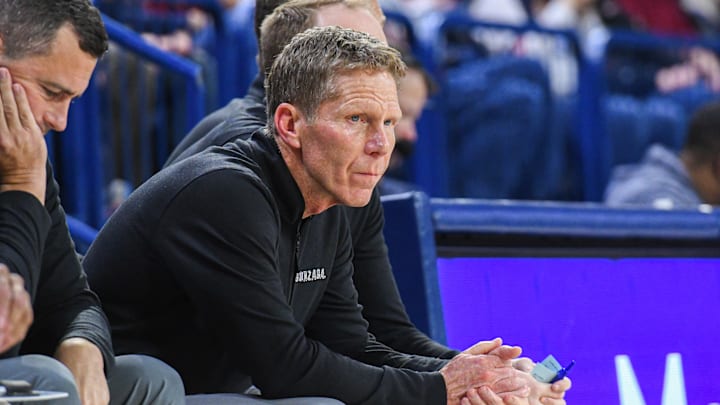Gonzaga is ‘not a candidate’ to join Big 12 or Big East

In this story:
Recent momentum for Gonzaga to join a power conference in the near future has been squashed as the impending next wave of conference realignment seems to have been put on hold.
On Monday, CBS Sports’ Matt Norlander shared in a podcast with Gary Parrish why Big 12 commissioner Brett Yormark had to pause the league’s discussions about adding UConn. Yormark presented a plan to add the Huskies in all sports with the exception of football, which would need serious investments from the school if it wanted to join the league in 2031. Ultimately talks were put on hold after it was reported too many Big 12 leaders didn’t see the benefit of Huskies football.
UConn was first linked to the Big 12 around this time a year ago, along with Gonzaga, as Yormark sought to create the best men’s college basketball conference in Division I. Time will tell if the Huskies are ever reconsidered; Gonzaga, on the other hand, seems committed to the West Coast Conference.
“Gonzaga … it's not a candidate at all for the Big 12, and it remains not a candidate to go to the Big East,” Norlander said. “So its future still remains an intriguing one moving forward.”
The WCC added the last two Pac-12 schools — Oregon State and Washington State — as affiliate members for the next two seasons. The league will swell again in 2025-26 when Grand Canyon and Seattle U join the mix as full-time members. Both expansion moves received full support from Gonzaga, according to WCC commissioner Stu Jackson, and should give the league a boost on the hardwood and in other sports for the future.
Mark Few and the Bulldogs have made quite a home for themselves in the WCC, evidenced by two national championship game appearances within the past seven years and a current run of nine straight Sweet 16 appearances. As a whole, the WCC ranked inside the top 10 conferences on KenPom.com for five seasons in a row from 2019-2023. As for off the court, though, the WCC and many other small leagues like it across the country face a continually growing uphill battle as the power gap between FBS conferences and non-FBS conferences grows wider.
Among the myriad of changes happening across the landscape of college athletics, the role of NIL and third-party collectives is of concern in the courtroom after the House v. NCAA settlement was sent back to the drawing board by a U.S. District Judge last week. In the multibillion-dollar agreement’s terms, schools would be allowed to share revenue directly with their student-athletes up to a limit, which is expected to be $20 to $23 million per year. In exchange, the NCAA would enforce rules that it says are designed to protect a competitive balance among schools.
Attorneys will need to make seem changes to the settlement before it can be considered for preliminary approval, though it’s expected that at some point an agreement will be officially reached.
While power conference schools could in theory shell out $20 million per year in revenue with student-athletes, the smaller leagues across the country wouldn’t be able to say the same. Not to mention, schools would have to contribute their share of the $2.8 billion in damages owed to current and former student-athletes by taking revenue distribution cuts from the NCAA over the next decade.
As everyone in college athletics prepares for change, Yormark has been aggressive as leader of the Big 12, which has added eight schools over the past two years and boasts the best men’s college basketball conference in the country per KenPom. Additionally, the Big 12 has explored selling its naming rights to a sponsor and private equity investment as ways to create more value. By the time the conference will need to renegotiate its TV contract in 2031, it's estimated that each Big 12 member could earn around $50 million per school year in revenue.

Cole Forsman is a reporter for Gonzaga Bulldogs On SI. Cole holds a degree in Journalism and Sports Management from Gonzaga University.
Follow CGForsman